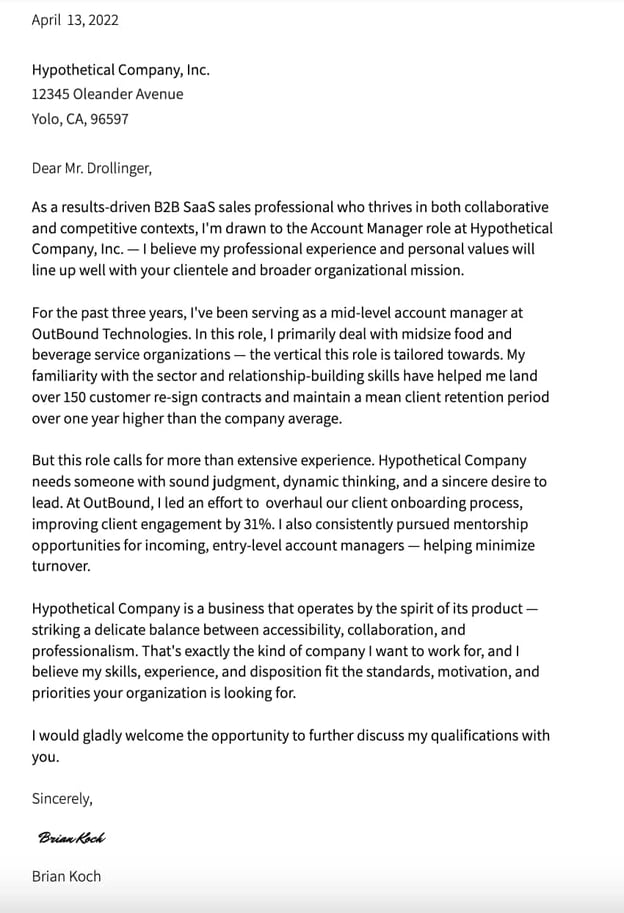A strong sales cover letter can do a lot for you as an applicant — like demonstrate effective communication skills, show you're invested in the opportunity, and give you room to add some color to your application.
.jpg)
That said, stringing cover letters together is often one of the more grating, monotonous tasks job seekers have to put up with — but while putting a sound sales cover letter together can be a chore, it doesn't necessarily have to be a challenge. There are some key tips, strategies, and structures you can fold into your letters to make them as compelling as possible.
Let's take a look at some of those tricks, review how to arrange your sales cover letter, and see an example of what a solid one looks like in practice.
Sales Cover Letter Tips
Keep it concise.
You should aim to keep your cover letter between three to five paragraphs, and under no circumstances should it be more than one page. Employers fielding a high volume of applications could be leafing through hundreds of cover letters every day. If you're too long-winded — stringing together a multi-page history of your entire professional life — you're going to get overlooked.
Use a professional font.
A cover letter is a professional document, so it warrants a professional presentation. Don't get too cute with your font selection or colors. Go with something like Times New Roman, Arial, or Calibri — and always have the text be black.
Avoid flowery language without sacrificing flow.
You're not writing an English essay or preparing for a poetry slam here. Again, you want to keep things professional. Avoid flowery phrases like, "At your leisure" or "Please find attached herewith.” That said, you want your letter to flow and sound natural, so try not to come off too stiff.
Highlight relevant skills.
Pore over the listing for the role you're applying for. What is the company in question looking for? What specific skills and qualities do they call out in the job description? Once you have those questions squared away, try to find ways to include those elements in your cover letter.
Reference quantifiable achievements.
In most cases, employers won't look at the skills you highlight and just take you at your word — you need to point to hard, quantifiable results that demonstrate you're the real deal.
How to Write a Sales Cover Letter
Header
If you’re applying to a conservative company or work in a formal industry — like finance, healthcare, or law — include a full heading: Your name and address, followed by a space, the date, followed by another space, and the company name and address.
But if you’re applying to a less formal place, you can probably get away with simply writing your name and email address — followed by a space and the company's name and email address.
Greeting
Maybe you’re not sure who will be reading your cover letter — but don’t write "To whom it may concern," "Dear hiring manager," or any other generic title. With a little research, you can usually find the hiring manager’s name.
Let’s say you’re applying for the SMB Account Executive role at Joyfull. Google "SMB sales manager Joyfull" and see if you can find the team’s leader on LinkedIn. When applying to a conservative company, write “Dear Mr./Ms. [Last name].” When applying to a startup or relatively relaxed organization, write “Dear [First name] [Last name].”
Intro
Your intro paragraph should highlight why you’re a great fit. It’s a high-level overview, rather than an in-depth exploration of your work history and qualifications, so keep it under four sentences.
The standard cover letter opening line is something along the lines of:
"I’m interested in becoming a sales representative on your SMB team" or "I'm excited for the opportunity to apply for the SMB sales representative role."
While these sentences might not kill your chances of getting the job, they generally don’t help. You want to grab the reader’s attention and sell yourself from the very start — so don't be reluctant to try a personalized, compelling line that will draw the hiring manager in and make them want to read more.
Here are a few examples:
"I love working with small businesses — in fact, I’ve helped more than 300 in the past year at my current job — which is why I’m so excited about the chance to help SMBs discover Joyfull."
"Every week, I write a blog post about a common SMB challenge. Helping SMBs overcome this obstacle isn’t just rewarding -- it’s also a great lead gen strategy. My passion for this type of work led me to your SMB Account Executive position."
Do you know a current or former employee who speaks positively about the company? Mention them in your intro. In some cases, you might have their referral — either by submitting your application or connecting you with the hiring manager — but even if you don't, you can still drop their name.
For instance, you might say something like, "As a self-starter who thrives in autonomous, results-oriented environments, I’m drawn to the BDR role at Red Shelf. I’ve heard great things about the culture and learning opportunities from Sarah Grossman, who started as a BDR and now works on your L&D team."
First Body Paragraph
In this paragraph, choose a relevant work experience. What does "relevant" mean? You’re trying to show your existing abilities and knowledge map well to the role you’re applying for, so if you currently work in retail and you want to become a business development rep, you might write:
"As a floor associate for Wilson & Co., I help 60-plus customers every day with questions about brands, fit, quality, and more. This experience has taught me how to provide a positive customer experience and be helpful while driving sales — both skills I’d use as a HubSpot BDR. Finally, it’s made me comfortable approaching strangers and acting as a product expert, which would be invaluable when reaching out to inbound leads."
Second Body Paragraph
The second body paragraph follows the same structure as the first. Take another relevant work or educational experience, and connect the dots to the role you’re applying for. Imagine you’re currently an AE applying for a manager position. Your second section could read:
“In the past 16 months on the Pacific West team, I’ve taken several opportunities to grow my leadership abilities. I started a mentorship program for new reps, pairing them with salespeople who have been at the company for at least two years. This program has been a huge success — the half-year retention is 20% higher for participants versus those without mentors. As a sales manager, I’d continue to look for ways to support, mentor, and train my salespeople so they can maximize their potential."
Third Body Paragraph
If you have another relevant experience, discuss it here. But you don’t have to add a third paragraph just for the sake of adding one — a lot of the time, a shorter cover letter is better, provided you can convey an appropriate amount of relevant information.
Let’s suppose you’re applying for a sales engineer role — a highly technical and demanding job that likely warrants a three-paragraph cover letter. You could say something like:
"After spending two years in customer support, I’m in my element when answering product-related questions. There’s nothing I enjoy more than getting a challenging ticket I can dig into — and there’s nothing more satisfying than finally solving it. As a sales engineer for HubSpot, I’d get the chance to talk to customers about the product on a daily basis and answer their most complex questions. In addition, I could use the communication skills I’ve honed as a support rep."
Conclusion
This section doesn’t need to be long or flowery. Many people end with unnecessary statements like, "Please let me know if I can provide any more information” or "Thank you for your consideration."
The problem with these? A hiring manager can safely assume you’ll give more info if asked and are appreciative of their time. You’ll seem like every other applicant who’s grabbed a generic template from the internet — which, okay, you might be doing, but they don’t need to know that.
Instead, reiterate your interest with a strong summary line like:
“The best days at work are usually the longest and most demanding — because I go home knowing I’ve helped multiple owners dramatically change the course of their businesses. Your hyper-loyal user base suggests being a Joyfull AE comes with even more opportunities to help young and growing organizations.”
Sales Cover Letter Template
Dear Jane Doe,
I’m passionate about [helping X type of customer, solving Y goal, working in Z industry] — which is how I found the [open position] at [company name]. The more I learned about [company’s] mission to [insert mission here, i.e. “improve the remote working experience,” “make personal finance easy”], the more excited I became. My [applicable skill #1 and applicable skill #2], as well as experience in [field] and knowledge of [related topic], would make me an asset to the [department, i.e. “Customer Development”] team.
As a [title] at [current employer or skill], I’m responsible for [doing X and Y]. This has helped me develop [ability] -- in fact, [insert proof of your skill, e.g. “my boss recently said I was one of the most resourceful employees he’s ever had” or “I’m known for my ability to stay collected and take the lead during high-pressure situations.”] I’d use [X skill] as your [job title] to [achieve main objective].
I’m also [skilled in X/possess Y and Z positive traits], which comes from my [previous work or extracurricular experience]. [In that role, on that team], I developed a knack for [skill/traits]. This was instrumental in [hitting specific milestones/exceeding expectations]. You’re looking for someone with [X skill/character traits], and I believe I’m a good fit.
Over the past [number of years], [company] has [accomplished X goal, such as “become a leader in the CRM space” or “used creative marketing and social media campaigns to become a household name in Colorado.”] It looks like you have ambitious goals for the future -- I hope I get the opportunity to contribute.
Thank you,
[Your name]
Sales Cover Letter Example

Why It Works
This cover letter is effective for a few reasons. For one, it speaks directly to how the applicant's hard, quantifiable achievements align with both the role's required technical acumen and the more abstract qualities needed to thrive in it.
By alluding to the fact that they're familiar with the vertical the role serves, the applicant establishes the relevance of their experience — and by touching on elements like their experience with mentorship, they're demonstrating their growth potential within the role.
If you're in the middle of a job hunt, odds are you're going to write your fair share of cover letters — so knowing how to put a compelling one together is in your best interest. It might be the difference between ultimately landing a sales role and not even popping up on an employer's radar.
Sales Career Growth



